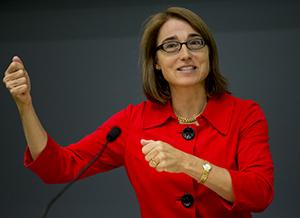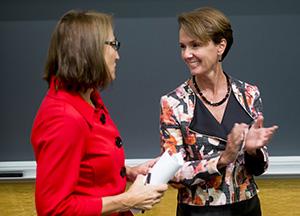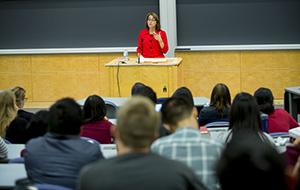Promoting a Grassroots Solution to Global Terrorism
U.S. Under Secretary of State Sarah Sewall Touts the International CVE Movement, "Countering Violent Extremism," by Building Broad Partnerships in Civil Societies to Identify and Meet Community Needs Before Radicalism Can Grow
New York, September 28, 2015—A new strategic program to promote inclusive governments and human rights can prevent the spread of terrorism, said Sarah Sewall, the U.S. Under Secretary of State for Civilian Security, Democracy, and Human Rights, in a speech last Tuesday at Columbia Law School.
| U.S. Under Secretary of State for Civilian Security, Democracy, and Human Rights, Sarah Sewall, spoke on the international "Countering Violent Extremism" movement. |
Sewall said this program, “Countering Violent Extremism,” has spread internationally since a White House summit on the topic in February, with the staging of several regional CVE conferences ahead of next week’s United Nations meeting on counterterrorism and the rise of the Islamic State of Iraq and the Levant, or ISIL.
“We are eager to understand why violent extremism proliferates and to develop effective solutions,” said Sewall, who stressed the need for a long-term strategy to combat future threats. “Terrorist groups recruit by preying on human needs that are unmet or exploiting situations where there may be violations or abuses of human rights, and terrorist groups will continue to capitalize on local grievances and anger.”
By forging partnerships “beyond governments”—including representatives from civil societies, businesses, and faith communities—counterterrorism efforts can better identify and address “needs and grievances” before these troubles are exploited, she said. The CVE partners can then work to provide “political, economic, educational, and entrepreneurial development so people have hope for a life of dignity.”
The challenge, she said, is to identify countries and regions not yet in crisis—to begin the CVE work before it is too late.
“We must identify the places that could next metastasize into the chaos that breeds terrorism and instead seek to improve and invest in those communities,” Sewall said. “By the time terrorism is full blown and a country is in full war conflict, the prevention opportunity is lost.”
While Sewall stressed the need for more research to align future actions with empirical evidence of their effectiveness, the enormity of the terrorism threat today underlines why it is “tactically essential that we spend more time at the front end, understanding the problem and formulating the correct interventions.”
| Columbia Law School Professor Sarah H. Cleveland, right, introduced Sewall at the event. |
Sewall said she had spent the morning at a research conference on CVE, where participants stressed the importance of telling success stories to instill hope that situations can improve. She told her own anecdote, recalling a recent trip to Mombasa, Kenya, where a police commissioner has sought to abandon mass arrests in favor of intelligence-driven operations, calling for meetings with civil society representatives, who were happy to discover the CVE agenda helped them to connect with government officials.
“Previously, there had been limited NGO-government dialogue on virtually any topic, including security issues,” Sewall said. “Now civil society activists, religious leaders, and others meet with the police to discuss how to increase the transparency and accountability of security forces.”
More CVE success stories will be in President Obama’s September 28 speech before the United Nations General Assembly, Sewall said.
Columbia Law School Professor Sarah H. Cleveland, faculty co-director of the Law School’s Human Rights Institute, introduced Sewall at the event.
| After her speech, Sewall took questions from students. |
Before becoming an under secretary of state, Sewall was a senior lecturer at the Harvard Kennedy School of Government, where she also was director of the Carr Center for Human Rights Policy, launched the Mass Atrocity Response Operations Project, and oversaw the Program on National Security and Human Rights. She previously served on the U.S. Defense Policy Board and on the boards of Oxfam America and the Center for Naval Analyses. She led research studies of U.S. military operations for the Department of Defense, and, in 2012, was Minerva Chair at the Naval War College. During the Clinton Administration, Sewall served as the inaugural Deputy Assistant Secretary of Defense for Peacekeeping and Humanitarian Assistance.
Her speech—“Why Counterterrorism Needs Countering Violent Extremism: How Human Rights & Good Governance Help Prevent Terrorism"—was co-sponsored by the Columbia Law School Human Rights Institute, the Institute for the Study of Human Rights, the Center on Global Governance, the Columbia Society of International Law, and the Human Rights Concentration at the School of International and Public Affairs.


